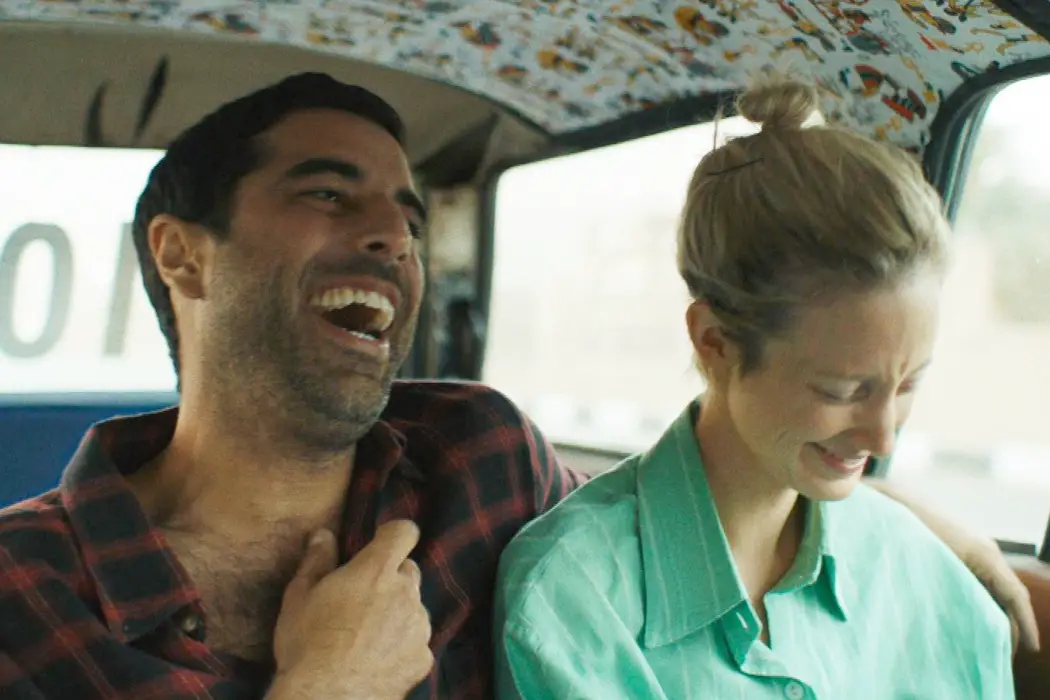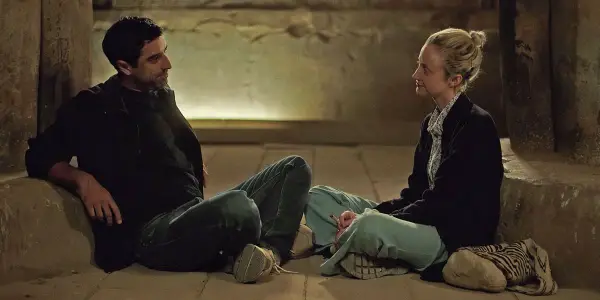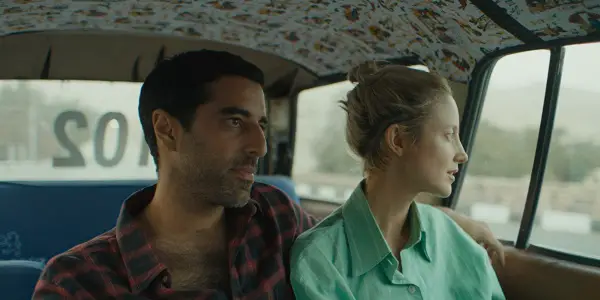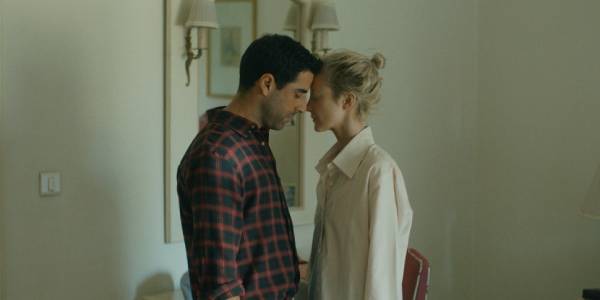“There Is No Reason For Us To Identify With Things That Divide Us”: Interview With Karim Saleh, Star Of LUXOR

Former film student from Scotland turned writer and film reviewer.
“I’m sorry I’m late”, I say when I’m connected through to Karim Saleh. We’re here to discuss his new movie Luxor, in which he – alongside Andrea Riseborough – stars. I had gotten a call the exact moment I was due to call him, and so I was held up. “Ah, we’re here now”, he says. “And it’s only five little minutes”. He is very soft spoken and reassuring when he speaks, immediately setting me at ease. Although I can’t see him, I picture him as his character in Luxor, Sultan. Charismatic and laidback to the point of near verticality, smiling effortlessly and genuinely.
Born in France to Lebanese parents, Saleh ostensibly got his break appearing in Steven Spielberg‘s Munich. Since then he’s worked steadily in America – where he now lives – appearing in TV shows such as Transparent, and the criminally underrated Counterpart starring J.K. Simmons. He also appeared in Zeina Durra‘s The Imperialists Are Still Alive! which could arguably have led to being cast for Durra once again in Luxor.
Although he presents the image of nonchalance, Saleh is very passionate and articulate. Our conversation encompasses travel, spirituality, the geopolitical landscape of the world right now, and hiding in an airplane from Andrea Riseborough. Much like the character he portrays in Luxor, he is easy to talk to and forthright about his beliefs.
Daryl MacDonald for Film Inquiry: So this is the second film you’ve made now with Zeina Durra (the first being The Imperialists Are Still Alive!), how do the two experiences compare?
Karim Saleh: I think we were both at different stages in our careers. In Luxor we were both immersed entirely in our work whereas, in a sense, on Imperialists it was a little bit more social in nature. Luxor is so silent and psychological that we were very much in our own inner lives, reaching each other from afar. Whereas Imperialists was set in New York, about a group of people who were connecting with artists and with each other. There was a social element to it.
Both Zeina and I tend to emulate the style of what we’re doing in order to achieve it, so that there’s a coherence between what we’re doing and how we behave. They were both extremely fun experiences, and I think the way I experienced them was really in accordance with their style. New York was very chatty, very social. We were loud, we were in clubs. It was cold! You know, we were wearing these layers and layers of clothes! There was something extremely warm and artsy about it.
Luxor was a very meditative experience, for both of us. It meant that we were holding on to the form of it. We were emulating the context.
How did you get involved with The Imperialists Are Still Alive?
Karim Saleh: Well, the way that [Zeina and I] met was almost serendipitous because we were both at a BAFTAs screening of a Jordanian film and she walked up to me at the end of that screening and said “I hope you’re an actor because I’m looking for someone with your exact sense of energy and specifications” and I said “I am!”

That does sound very serendipitous! So how did your relationship with Zeina impact your being cast in Luxor?
Karim Saleh: Over the years we would spend time together and I sometimes read some of her scripts that she was developing. Then she sent me the Luxor script almost in its finished form. I was used to being involved in her process a little bit more. Not making any decisions, but reading different versions of scripts. In this particular instance, I was sent this finished work and very politely she asked me to audition, which I thought was a really great idea.
Do you enjoy auditioning?
Karim Saleh: For me, auditioning is a way to start developing your relationship with a character and it’s also a way to say “this is my proposition, how much do you want to modify?”
We had a very formal approach. I was sent a script and I auditioned, which usually happens with strangers.
What was it about the Luxor script that drew you in?
Karim Saleh: There were two fundamental things that I liked about the character. The first was that he had some intellectual capacity. He’s an academic, he’s able to express himself, he’s not operating from a completely irrational or emotional place. Which I enjoyed because it’s not always the case with the characters that I’m offered! Very often [I’m offered] these wonderful, emotionally complex characters but not the most academic or rational people.
I loved the fact that he was an archaeologist because it meant he was involved in his own sense of identity in a way that was older than what you would usually expect, with all the geopolitical influences that are determined by the past thirty or forty years. When these countries were drawn out with postcolonialism, people identified with the idea of being Syrian when it’s an abstract thing that started in the forties.
The fact that he’s an archaeologist meant that he derived his sense of himself from something almost too old to even be defined. So it seemed that this intelligent person had a connection to something older and more universal in his sense of himself.
Wow. You really got invested in the character.
Karim Saleh: And then I loved the fact it was a love story! I also loved the fact that Zeina was smart enough and delicate enough to keep all the misery of what’s going on in the Middle East in the background and to tackle that through the psychology of Hana (Andrea Riseborough‘s character) and avoid mentioning it or filming it. In that way, I think that the script was extremely delicate and not exploitative.
Hiding From Andrea
Did you know Andrea before you started filming or was that the first time you met?
Karim Saleh: Not only did I not know Andrea beforehand – and I’m really embarrassed to say that – but because Andrea is an extremely talented, chameleon-like actor, whatever work I had seen of hers meant I had a strong impression of the characters she played.
I go to this acting class in L. A and everybody’s younger than me in the class! So I said “I’m doing this project and Andrea Riseborough‘s attached” and all of the girls in my class – who were in their 20s and 30s – celebrated! You know, they fanned out! They said she’s amazing, and started telling me what she was in. And as they were speaking I still didn’t put it together because I tend to be so involved with the character rather than the actor. I had spent a month building Sultan’s relationship with Hana in my mind and I didn’t want anything to distract from that.
Eventually, I saw this woman get on the plane from Cairo to Luxor and I figured that that was Andrea. I was too nervous to introduce myself, so… I kinda hid [laughs]. We were in Egypt, so I was more incognito than she was. She could’ve looked around that plane and seen a few faces, but I felt like I was camouflaged by my resemblance to Egyptians!
Haha! That’s amazing, you hid from Andrea Riseborough!
Karim Saleh: Well then we got to Luxor airport, and my luggage was lost. We were being driven to the hotel in the same car, so I said “you go ahead, I’m gonna deal with my luggage”. Then Andrea said, “no, I’ll stay with you”. And bypassing all the apprehension and prejudices you may have about someone who has done such amazing work, it was almost a moment of intimacy that happened at the airport which allowed us to start a real conversation about what we were doing right now and not what we had done before, you know?
When I spoke with Zeina, we discussed that the heart of Luxor was the central relationship between Hana and Sultan, and that so much of the movie was non-dialogical. This meant that you and Andrea had to develop this relationship with each other that is largely communicated through body language. What was that like?

Karim Saleh: Well it turned out that we both have similar tastes in how to approach things and the last thing that either of us do – even in our different methods – is plan things out. Planning things out, for me, is not organic. What I do is prepare really intensely for months, I build up my emotional relationship with an imaginary character called Hana, I listen to her speak through the script and draw on my own experiences to give her a texture. Once I get to the set, the whole thing disappears. It becomes something that happens in the moment, which is what I believe to be the definition of performance.
We had a table read and we both spoke about our characters, and what we quickly understood at that point was that both of us had done a lot of work and we both had a really strong sense of who we were in that story. That really comforted us in knowing that we were going to be able to play off each other. So there was a lot of trust going in.
Zeina also told me the shoot was 18 days. She described it as a “whirlwind”. What was your experience of the shoot?
Karim Saleh: Well there was this added element of going back to the Middle East for work. I mean, I’m Lebanese but I haven’t lived in the Middle East for almost twenty-four years now. I only visit occasionally; sometimes I’ll go see my parents for Christmas, but that’s almost every four years.
Things slow down for me when I’m in the Middle East. It’s almost like I get lulled by the timelessness of it, and so for me, there was a combination of a hectic schedule but also a feeling of having gone home, and the kind of comfort that that brings.
The other thing is I had to do a little bit of last-minute research. I had to go with a guide and visit some of the archaeological sites with them. I wanted to walk around and get a feel for the streets for Luxor because I’m supposed to have been there for a very long time. So there were moments when I was at home, and moments when I was a tourist.
What was it like visiting those archaeological sites?
Karim Saleh: It gave me a sense of where I was. That didn’t feel hectic. It felt very immersive… almost sensual.
The Spirituality of Luxor
There was so much spirituality in the movie. Did you get a sense of Luxor being a very spiritual place?
Karim Saleh: Completely. I think the spirituality of [the movie] was the bedrock on which the love story was built, and the bedrock for which the healing story for Hana happens, and that was a very tangible thing that we experienced in Luxor.
The magic of it is because it’s pre-monotheism. It’s not stigmatised. When I think about Abrahamic religions, I think about the Inquisition, I think about the Islamic conquests of the Middle East, I think about the state of Israel. Whenever I think about our monotheistic religion there’s an anxiety that creeps in because I’m so aware of the history that it carries, and some of it is very painful and very divisive.
Whereas when you go back a little bit further in time you kind of transcend a historical understanding of those religions and it suddenly opens itself up to the unknown. In that openness – in its very fundamental and primal innocence – it reflects the mind better than the religions that we’ve seen too much of. It’s spiritually liberating to be involved with such an old religion and I think [Luxor] was really pregnant with that.
Yeah, I definitely got that feeling too. Zeina mentioned that it’s a very timely movie because of everything going on right now. It was a lovely piece of escapism to watch these two people walk around Luxor when, right now, no one can really go anywhere.
Karim Saleh: Yeah, I think the escapism piece is really important. You know how we selectively choose our pasts, so everybody decides “okay, my life starts there, my identity starts here” right? Everybody relates to a particular time in their nation’s history, or a particular time in their religion’s history, or a particular time in their personal history, to say “this is the event that defines me”; to go beyond that, to go to a point where it’s not defined and still feel a connection to those old societies is extremely liberating. It’s escapism but there’s also a transcendental quality to it; it’s a sense that perhaps we can get perspective going back as well, that things didn’t start with the politics and the ideas that we know.
There was something before. And something that we can still relate to. I think it broadens the horizons and the limits of the inner life. I think there’s something very peaceful and gratifying in going back.
It sounds like you believe there’s a lot we can learn from those old civilisations and cultures.
Karim Saleh: I think there truly is. At a time where there are so much fragmentation and divisiveness – you know, if there was an alien invasion, people think that we would all come together in the face of this strange thing coming from, you know, the future; in reality, we have that in our past, we have the capacity to look back on our common history and iron out some of the divisive ideas that we’ve picked up along the way. I think that could be very healing.
“We have so much that unifies us”
That’s a really interesting point. So how do you feel those ideas apply to where we are in the world today? With all the, as you say, divisiveness… what’s the answer?
Karim Saleh: I think that, for me, it’s really important that we transcend our ideas of “the self” in order not to create divisive notions of identity. There is no reason for us to identify with things that divide us. We have so much that unifies us and we can also define ourselves through those unifying factors and in those unifying stories.
In the Egyptian pantheon, there’s a projection of the inner life, of the imagination, not just of the history. I think the thing we all have in common is the capacity for imagination, the capacity to conceive our future. And we also have the capacity for love, and I think imagination and love are such fundamental components of human nature that it’s enough to unify us around those concepts.
I mean, I don’t want to sound like I have the answer to anything, but that’s what I take from it, you know?

What’s it like to live in LA having come from the Middle East? Do you feel there are fundamental differences in the way of life?
Karim Saleh: Well, I grew up in Lebanon in the 80s, and that was a place torn apart by religious war, you know? Beirut in the 80s… I mean it doesn’t even compare to Baghdad today because Baghdad today is its own sense of chaos and I think it’s much worse in a sense.
What I learned in Beirut in the 80s was that in the midst of total chaos you can still have some form of structure, you can still have an education, and you can still love people. People from opposite sides would interact, they would be in business together, you know? The lines are blurred. Even in conflict, there were no defined sides, that everything was open to negotiation.
There’s a similar sense in Los Angeles, where you go up against a system that seems so rigid, so entrenched in its cultural and racial preferences, but then you see the number of people who are trying to bring something new to it. They’re trying to include people and their stories, and bring stories that are contrasting with the established norm.
In a sense, it’s almost like I learned the skills of negotiating with Hollywood from Beirut in the 80s. [laughs] I approach people with the knowledge that no matter how stuck in their ways they seem to be, nothing is what it appears to be. There’s always room for negotiation, appealing to someone’s humanity and curiosity. Even in conflict.
They’re different battlegrounds but it’s a similar process.
Sounds like there’s a lot of really interesting parallels between the two different worlds.
Karim Saleh: Yeah, I think in the dialectic of it. We live now in a place where identity politics are really driving everything, and the civil war in Lebanon was an identity crisis; I think that the parallels are huge.
The way that you respond to democracy and the way you respond to total chaos are completely different things, and the manifestations of those struggles are different. Fundamentally, the question of identity remains in everything that I do and in everywhere that I go. I think it’s something I’ve become quite experienced in dealing with.
Karim, it has been wonderful speaking with you. Tell me, do you have anything coming up in the future we can look forward to?
Karim Saleh: Oh yeah, I just did an amazing film with Andrea called Please Baby Please by Amanda Kramer and I think that’s going to be an absolute riot of a movie!
Ah, that’s nice you’re working with Andrea again.
Karim Saleh: [laughs] Yeah, we had the joy of working together again.
Film Inquiry would like to thank Karim Saleh for taking the time to speak with us.
Karim Saleh is clearly a very spiritual person; what do you think of spirituality in movies? Let us know in the comments below!
Luxor will be available on Digital and VOD from December 4th.
Watch Luxor
Does content like this matter to you?
Become a Member and support film journalism. Unlock access to all of Film Inquiry`s great articles. Join a community of like-minded readers who are passionate about cinema - get access to our private members Network, give back to independent filmmakers, and more.












